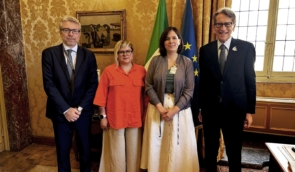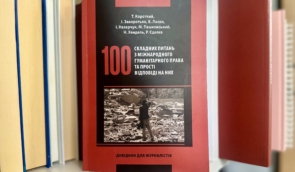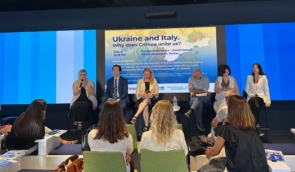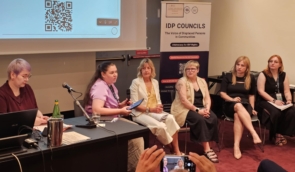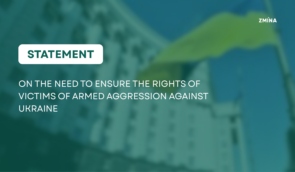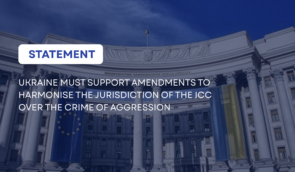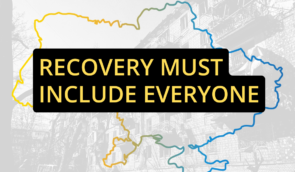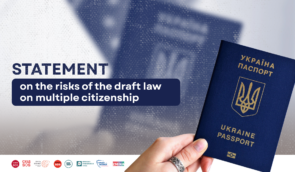Council of Europe Member State leaders must use the 4th CoE Summit to commit to stronger role for civil society at the CoE
In a joint statement issued on 15 March 2023, Human Rights House Foundation and members of the network of Human Rights Houses urge leaders of Council of Europe (CoE) member States to use the opportunity of the upcoming 4th CoE Summit to create and strengthen avenues for meaningful and active inclusion of civil society in the work of the CoE.
We, the undersigned members of the Network of Human Rights Houses, call on leaders of Council of Europe (CoE) member States to utilise the opportunity of the 4th CoE Summit to create and strengthen avenues for meaningful and active inclusion of civil society in the work of the CoE. Formal roles for civil society in the workings of the CoE remain severely limited. The CoE risks its long-term viability and legitimacy by continuing to limit the formal role of civil society.
Since the last CoE Summit in 2005, the CoE and member States have failed to establish new working modalities which fully reflect the critical role and voice of civil society in protecting and promoting human rights across Europe. While the CoE remains a vital regional human rights body, it faces a number of risks by not fully embracing a great opportunity for civil society engagement in its work. Today, civil society engagement at the CoE is restricted to specific areas and past political and institutional commitments to address this have failed to materialise into concrete actions.
Independent civil society is a key human rights stakeholder which is already playing an important role in the work of the CoE as well as in democratic nations across the region. Civil society works to domesticate CoE standards in member States, counter authoritarian forces across the region, build and maintain public support for the CoE, its values, and its mechanisms, and advocate for the implementation of European Court of Human Rights (ECtHR) judgements. At the same time, civil society strengthens democracies and democratic institutions by holding leaders and institutions accountable, strengthening the voice of vulnerable and marginalised groups, and mobilising the public. Despite these important roles, the CoE fails to provide permanent, formal, and meaningful roles for civil society in the workings of the organisation.
As a first step, CoE member State leaders participating in the 4th CoE Summit must demonstrate a clear and unequivocal political commitment to the following steps aimed at strengthening civil society’s role at the CoE:
-
Formal and on-going consultations with civil society in developing and implementing CoE strategies and policies. National NGOs should be widely consulted in the process of drafting, monitoring and implementing CoE action plans with their respective countries.
-
Strengthened and formalised exchange between civil society and the Committee of Ministers and the Parliamentary Assembly of the CoE which includes civil society access to premises, documents, and meetings.
-
Engagement and collaboration between civil society and the CoE in national level awareness raising and communications.
-
Mandated responsibility of CoE field offices, CoE staff, and PACE members and rapporteurs to actively engage with national civil society organisations and potentially serve as interlocutors for interactions between environmental and human rights groups, authorities, and other domestic human rights stakeholders.
-
Formal consultation and speaking roles, without the need for formal invitations, for human rights defenders and civil society actors throughout CoE instruments and mechanisms.
These five steps represent the bare minimum required to modernise the work of the CoE and reflect the unique role and contributions of civil society. Other multilateral bodies have important and formalised roles for civil society which provide opportunities for strengthened engagement. It is past time for the CoE to do the same.
In order for the Council of Europe to become “fit for purpose” and successfully promote and protect human rights, leaders at the 4th Summit must demonstrate political commitment to the key areas above and reflect them clearly in the summit’s declaration. This must be accompanied by a comprehensive action plan, providing full funding for all necessary steps.
Signed by:
Ba.B.e. Be active. Be emancipated. (Croatia)
Barys Zvozskau Belarusian Human Rights House
Belarusian Association of Journalists
Centre for Peace Studies (Croatia)
Civic Initiatives (Serbia)
Crimean Human Rights Group
CROSOL – Croatian Platform for International Citizen Solidarity
Democracy Today (Armenia)
Election Monitoring and Democracy Studies Center (Azerbaijan)
Georgian Centre for Psychosocial and Medical Rehabilitation of Torture Victims (GCRT)
Helsinki Committee for Human Rights in Serbia
Helsinki Foundation for Human Rights (Poland)
Human Rights Center (Georgia)
Human Rights Center Viasna (Belarus)
Human Rights Centre ZMINA (Ukraine)
Human Rights House Belgrade
Human Rights House Crimea
Human Rights House Foundation
Human Rights House Tbilisi
Human Rights House Yerevan
Human Rights House Zagreb
Index on Censorship (United Kingdom)
Legal Education Society (Azerbaijan)
Legal Initiative (Belarus)
Media Institute (Georgia)
Mental Health and Human Rights Info (Norway)
NGO “Center of civil education “Almenda” (Ukraine)
PEN Belarus
Pink human rights defender NGO (Armenia)
Rafto Foundation for Human Rights (Norway)
Regional Center for Human Rights (Ukraine)
Rights Georgia
Sapari (Georgia)
Sexual Assault Crisis Center (Armenia)
Ukrainian Helsinki Human Rights Center
YUCOM (Serbia)
If you have found a spelling error, please, notify us by selecting that text and pressing Ctrl+Enter.

